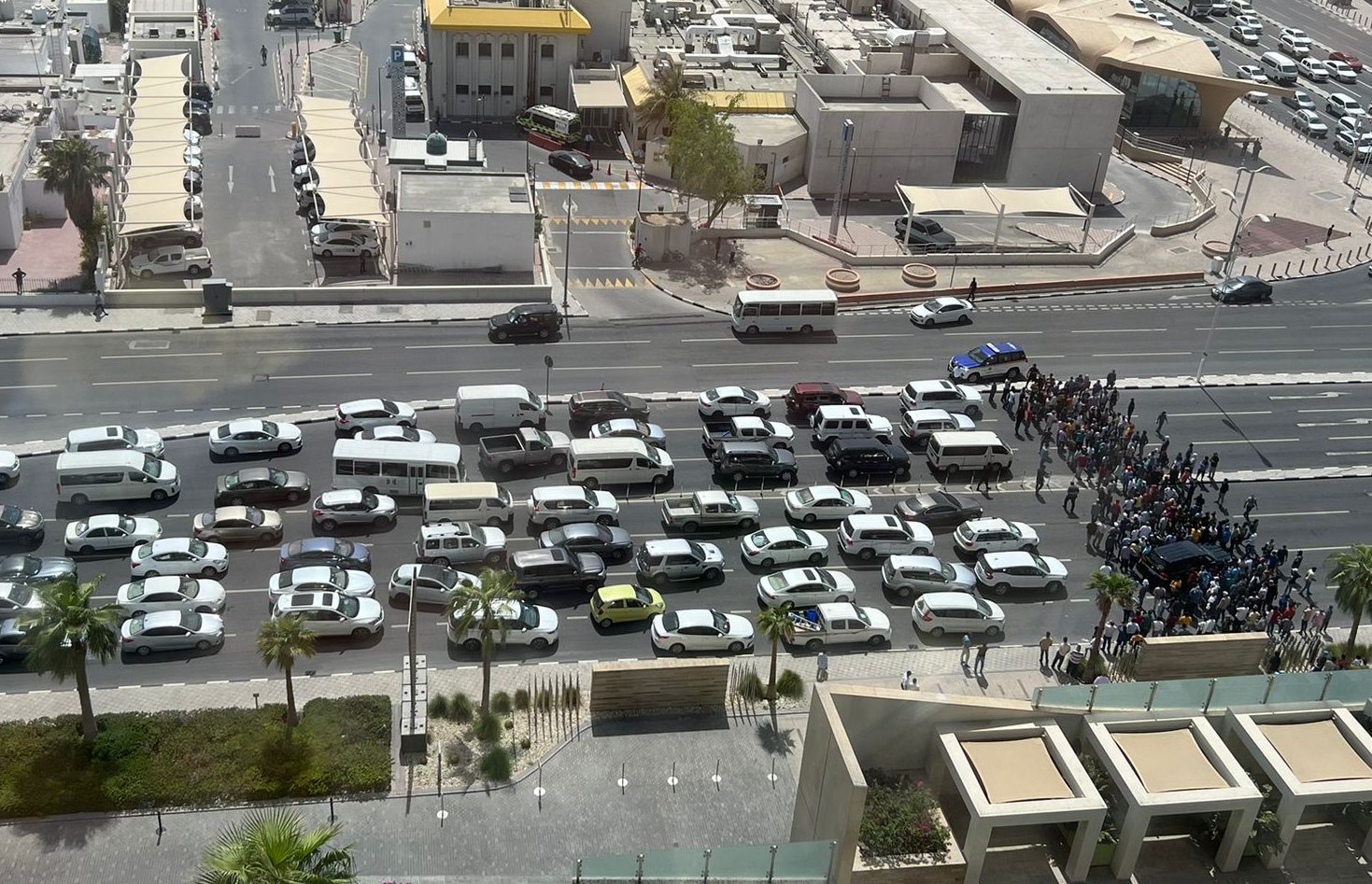Qatar has been praised worldwide for its labour reforms, however some violations still remain.
Sixty workers were arrested after taking to the streets to protest six months of unpaid work in Qatar, according to Migrant Rights.
A number of protesters were also deported from the Gulf state for taking part in the demonstration, described by authorities as a breach of public security laws.
“A number of protesters were detained for breaching public security laws. As this remains an ongoing investigation, details on individual cases cannot be disclosed,” a Qatari government official said in a statement sent to Doha News.
Dozens of labour workers had gathered in the Al Sadd district of the Qatari capital last week to demand payment from their employer Al Bandary Engineering.
In an interview with Doha News last month, employees at Al Bandary Engineering, Trading and Contracting, said they were not paid for more than seven months. More than 208 employees submitted a complaint to the Ministry of Labour, the workers told Doha News.
Photos and footage seen by Doha News have shown similar scenes of protest by employees of the same company on several occasions over the last few months.
However, it is believed that Al Bandary has been dissolved, with staff confirming to Doha News that it had released all of its labourers from duty ahead of Eid Al-Adha.
The company was formed in 2006, and is a part of Al Bandary International Group. Their projects range from hotels to high rise buildings, and according to their website, they have some 5,000 employees.
In its statement, the government confirmed it was already investigating the company ahead of the latest round of demonstrations.
“The company was already under investigation by the authorities for non- payment of wages before the incident, and now further action is being taken after a deadline to settle outstanding salary payments was missed,” the statement read, noting that all delayed salaries and benefits are being paid by the Ministry of Labour through the Workers’ Support and Insurance Fund.
Authorities in Doha also pointed to past occasions in which peaceful protests were responded to with swift probes to resolve various issues faced by workers.
Labour reforms
Over the last decade, Qatar has seen a number of historic labour reforms. In 2021, the country introduced the region’s first ever non-discriminatory minimum wage law, triggering praise worldwide.
Doha also launched a new platform for workers’ complaints in May 2021 to enable employees to submit public violations of the labour law.
More than 2,000 labour complaints were filed with the Ministry of Labour against firms and institutions across the country in December.
However, in recent months, there has been a slew of new complaints about working hours, compensation, and a variety of other issues. Some workers who spoke to Doha News say they have received no response despite filing complaints.
Separately, Qatar’s Wage Protection System, which requires companies to transmit all payments through Qatari banks within seven days of their due date, is now said to cover over 96% of eligible workers in Qatar.
In a separate statement sent to Doha News earlier this month, a Qatari government official said the Workers’ Support and Insurance Fund has disbursed almost QAR 600m to over 36,000 workers in Qatar since its emancipation in 2018 and up until the end of 2021.
The fund was established in 2018 to pay out compensation granted by Labour Dispute Settlement Committees when a firm goes bankrupt and is unable to pay its employees. This comes as international NGOs and human rights organisations demand that Qatar and FIFA compensate the workers who were on World Cup projects.
Companies in Qatar are legally required to compensate the families of all workers who die in a work-related incident. Immediately after a work-related death occurs, the company is required to report the incident through a dedicated electronic system. An investigation is then carried out by the authorities to identify the cause of death and determine whether adequate health and safety measures were in place.
If a violation occurred, legal action is taken against the company. Once the cause of death is identified as work-related, a final report is submitted to the legal authorities to determine the amount of compensation to be paid by the company to the family.
This decision is immediately enforceable under Qatari law.
Additional reform includes two key laws to eliminate barriers on migrant workers leaving the country and changing jobs without permission from their employers.
The new laws have the potential to strike at the core of the Kafala system, which continues to link migrant workers to their employers, if effectively implemented. However, there are numerous cases of employers not abiding by the reforms.
Employees told Amnesty International that changing employment still comes with major obstacles and opposition from dissatisfied bosses.
Qatar’s Minister of Labour Ali Al Marri recently stated that the legislative updates and improvements in the labour sector in recent years have been “continuous and sustainable” and will continue after the World Cup.







